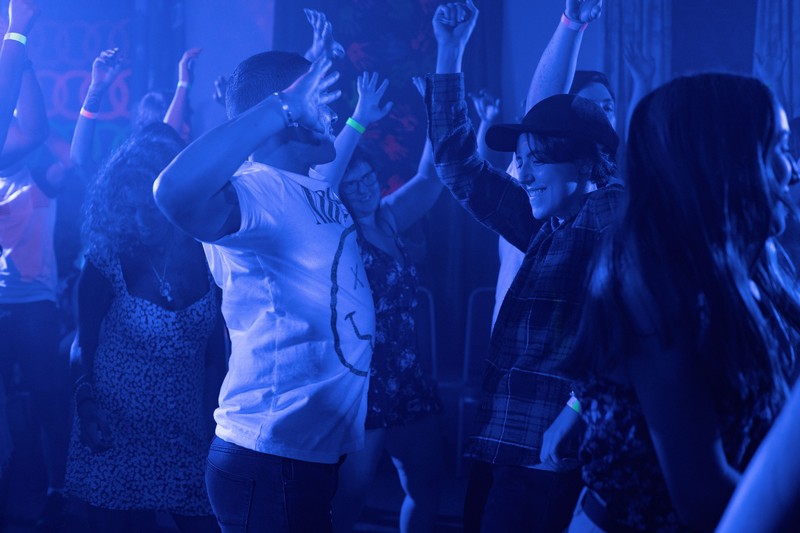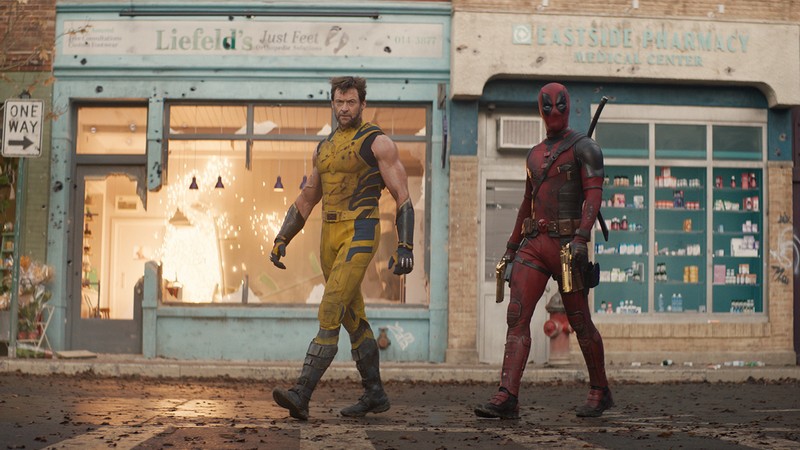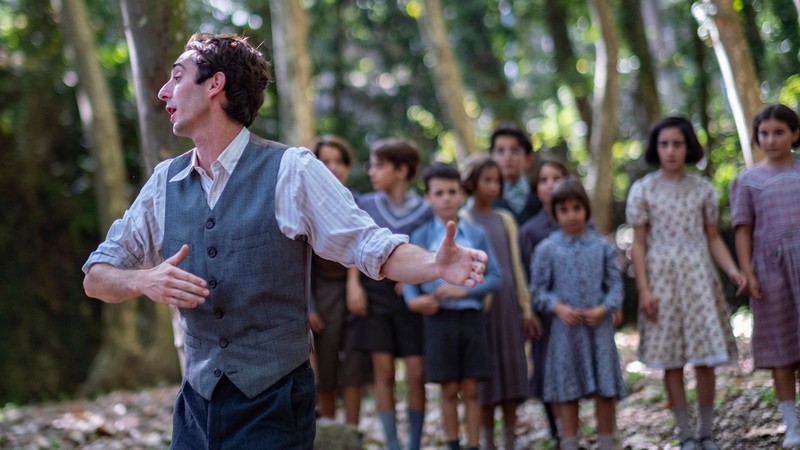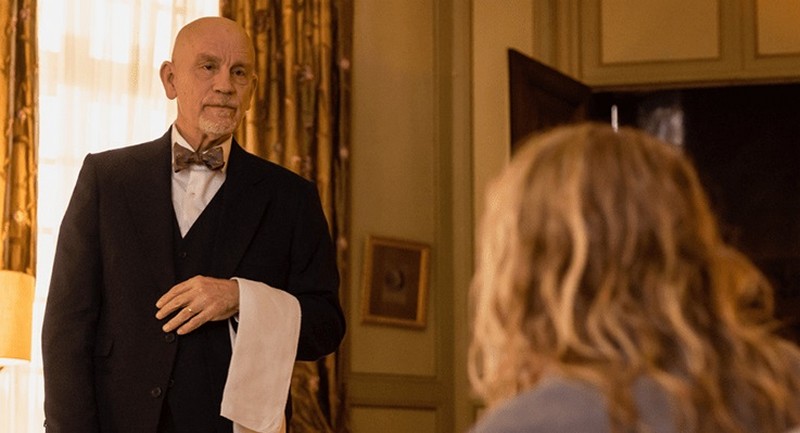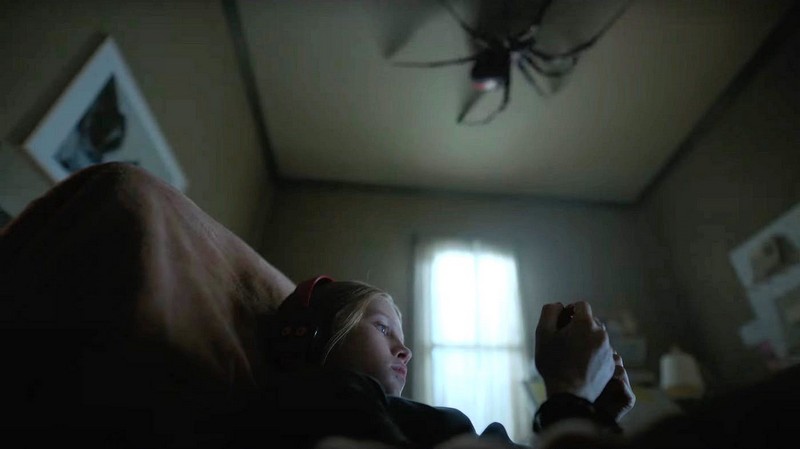Unsound is an Australian feature film directed by Ian Watson (Doctor Doctor, Janet King). When gigging guitarist, Noah (Reece Noi, Game of Thrones), quits the band of a 90s pop icon Moniqua (Christina Anu), he returns to his mother’s home in Sydney, Australia. Noah soon finds himself swept up in the life of a young, emerging trans man, Finn (Yiana Pandelis). Finn, who is deaf, runs a community centre and nightclub in his local community.
Patrick Scott: What inspired you to write the script?
Ally Burnham: I was working with Tsu Shan Chambers, Unsound’s producer, at the time on a different project. We just got talking about the types of stories which interested us, the things we were passionate about. I believe Tsu Shan was working with the Deaf community at the time, and for quite some time I’ve been bursting to tell a Queer story. And Tsu Shan was very passionate about rom-coms! She knew she really wanted to make a rom-com. So I started talking to some of my friends and family who are hearing impaired, and out of those discussions came a bit of an ‘ah-huh’ moment, where I learned – it’s a moment that translated to a scene in the film – that the Auslan sign for boyfriend/girlfriend is the same. There is this plasticine way gender is used in the language. And I thought that was really special, really beautiful, and from there I was like ‘okay, I can see how the themes might start to come together. I think we’ve got a story here.’

PS: Had you worked with the deaf community prior to this film?
AB: Not in a formal capacity, no. All my early interactions during development were informal – the term ‘research’ sounds too sterile – but it was a lot of conversations with family and people I knew who straddled the creative and Deaf community. Once the ball started rolling on the project, formal, paid consultants were brought onto the development process, who had the credentials to advise and speak on behalf of their community. And what a learning curve it was! ‘Unsound’ was unique for the level of consulting we did, and how many eyeballs were across all the drafts the script went through. It was a big undertaking as my first solo feature, and probably won’t be matched by any project I’ll work on for decades. I’m so grateful for the journey the script went on. It only continued to get stronger with every pass, and I would love to say, more authentic, the more people we involved who could speak to things beyond my own lived experience. I like to compare Unsound’s development to a patchwork quilt – formed from a wide variety of personal anecdotes – and I had the privilege of being the person at the loom, as it were.
PS: With the different marginalised groups that are in the film, what kind of consultation did you do before and during the film?
AB: Yes, to speak further to this, there were a few phases to the consulting. There were the Deaf and Trans consultants who read the drafts of the script and offered notes. Then once we signed off on the script, we moved into rehearsals. Our director Ian Watson talks about how he was spoiled as a director (in a good way) because he was able to run rehearsals as if we were rehearsing for a play. It was a solid condensed block of time, which is unusual for film. I too, as the writer, was involved in rehearsals, which often isn’t the case for screenwriters.
The reason it was so important: during rehearsals was when my English words on the page were being translated into Auslan by our Auslan consultants. Auslan as a language has its own set of sophisticated meanings, grammar, metaphors, etymology, etc. Whatever study I could have done during the five years development would never come close to the understanding a native Auslan user inherently brings. I worked closely with the Auslan consultant, making sure all the layers of English meaning in my text would survive the translating process. (And again, during postproduction, Auslan was translated back into English for the burned-in captions. It was a three-step translation process!) And naturally we had the lovely Sam Mathews as the film’s trans consultant and director’s attachment during rehearsals as well. Then we moved onto set, and every scene which involved Auslan had the consultants present, and we had another Trans consultant as a director’s attachment for the duration of the shoot.
PS: The film has a very multi-layered approach in that it’s a love story between a member of the deaf and trans community in Finn, as well as a member of the queer community in Noah. Why do you think those communities were important to bring together in this film?
AB: As I said, initially it came about from this thematic bread crumb of fluid pronouns in the Auslan language. But the more we dove into and spoke to the communities, the overlap of these communities might genuinely surprise the wider Australian population out there! A member of my family is in the venn-diagram of these two communities, which was more of a happy coincidence than something I intentionally set out to capture. At the heart of what we wanted to do was create characters that defy the labels the world puts on them. We wanted to embrace how ‘un-neat’ these characters are, and demonstrate that people aren’t two-dimensional and exist solely in a single box.
PS: Throughout the film, the deaf club are very passionate in voicing their identity and personality through weekly dance nights and even argue amongst themselves about the best way to do that. In what ways do you think this film might help voice the identities and concerns of the hearing impaired to the wider community?
AB: Early in, it became apparent that we didn’t want to represent these communities – and the Deaf community specifically – as a monolithic culture. Even within this community, there is a diversity of opinions! That is human, that is real, and that was important to showcase. And a lot of feedback I’ve received from people who’ve seen the film is how much they’ve enjoyed that element of the story. ‘We never realised there was more than one way to think about it’. Just like all social issues, our understanding and approach to awareness is ever evolving and changing (we’re onto the 4th wave of Feminism, right?) Therefore, it is important that the Deaf community is leading the charge on the discussions around Deaf awareness and accessibility – including all the points of contention in between! Also, at the end of the day, I just really wanted the story to break the mould – to showcase characters who are just like the people in my life, and who I love, who don’t often get their place up on the big screen. I genuinely had no interest in doing what has been done before.
PS: How do you think this film might help improve the diversity of Australian cinema or television?
AB: Gosh, it was a film we had to fight for. At the end of the day, I always told myself, as long as one person out there watches this film, and feels genuinely represented on screen, then that’s all that matters. But to speak to the wider picture, and my hopes for the film, let it be a film that opens the flood gates. Let it not be considered niche. Let Queer films and films featuring differently-abled actors not be considered ‘indie’, or strictly for those communities. We worked very hard to create something that will feel very mainstream. It was important to me that these characters are able to represent the same tonal space as all other hetero rom-coms that have come before.
PS: This film pays particular attention to normalise the relationship between Finn and Noah, with some tension and friction coming from their respective parents. Why was it important to not get bogged down in specifics of gender, and what role do you think cinema could play in the future in promoting these types of relationships?
AB: Being ‘trans’ or being ‘deaf’ couldn’t be the ‘obstacles’ our characters had to ‘overcome’, to speak in screenwriter terms. Our characters are Deaf and Trans, but these are facets of their personalities. Facets of our personalities sometimes cause conflicts with the people around us, or the world around us, but it’s not these things that need ‘fixing’. Both Noah and Finn need to learn and grow, but it’s their other traits they need to shed and evolve from, and never their sense of Deaf identity, Trans or Queer identities.
I was always interested in asking ‘the next question’, and what I mean by that is, we’ve all seen the films where, say if Trans issues are front and centre, the question of the film is ‘what is their gender identity’. I wanted to ask ‘what is the healthiest way for Finn to transition to the gender identity he already knows he is.’
In terms of the future of cinema, I see there are two ways stories usually deal with social issues. We can have the story that makes the issue front and centre, and dives deeply into exploring it. For example, the queer story where the character’s journey of coming out drives every scene. Or, you can write the story where it is set in a world where coming out isn’t even a thing. People are queer, it just is, it’s showcased, and never a point of contention. And that in itself I think can be extremely subversive. I want to give a quick shout out to Steven Universe here, which is one of the best examples of this style of ‘showcasing the issue’ storytelling I know of. It normalizes, without sensationalizing. And that’s what I hoped to do with Unsound.

PS: Even though the film is about deaf, trans and queer characters, much of the story focuses on their everyday lives and universal issues that could happen to anyone. In that regard, what would you say are the key themes of the film?
AB: Paula Duncan during a live Q&A once called Unsound’s screenplay ‘like a black forest cake’ implying that it was just layer upon layer of yummy goodness. And to date I do believe that is my favourite compliment I’ve ever received for my work! Asking a screenwriter to boil their stories down to one theme is like asking them to stand on a pin! I don’t think I can, and usually the themes I use during scripting are weirdly convoluted and not the same themes the audience walks out of the cinema with (theirs are normally much simpler and better, mind you.) But a driving saying of the creative team during rehearsals and on set was ‘love is love’. I liked it, because for me it was the connective tissue between all of the film’s plot threads. There is the obvious love between Noah and Finn, but then there’s also the parental relationships, of Finn and his father and Noah and his mother. There is the love Finn has for his community and Deaf club. There is the loving mentorship between Noah and Moniqua. And on the other side of the coin, is all the heartbreak these characters cause one another. ‘Love is love’ is what ties it all together.
Unsound is now showing in selected theatres
Patrick Scott
Other reviews you might enjoy:
- Suburbicon – movie review
- Sound of Metal (Amazon Prime) – movie review
- Marriage Story – movie and streaming review

Patrick Scott is a recent graduate from Monash University with a Bachelor’s Degree in Media Communications. He is a freelance film reviewer based in Melbourne, and contributor to The Blurb.

